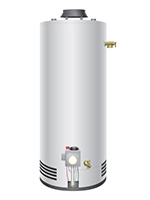How to Choose and Maintain Your Water Heater
Most homeowners don’t give a second thought to their water heater—until the hot water stops flowing. The following information from the National Association of the Remodeling Industry (NARI), will teach what you need to know when selecting a new water heater and how to maintain the one you have.
Storage tank water heaters have an insulated tank where water is heated and stored until it’s needed. They’re available in electric, propane, and natural gas models.
-Tank size is an important consideration. Base your decision on household size. One to two people will need a 30-gallon tank. Three to four people will use a 40- to 50-gallon tank.
-Also think about the recovery rate — the number of gallons of water the water heater can heat in an hour. The greater your demand for hot water, the higher the recovery rate you need.
-Know the dimensions of the space where your water heater will be stored and ensure that the one you want will fit.
Tankless, or on-demand, heats water as it passes through a series of coils in the unit instead of storing it.
-These units only heat water as you use it, so they are usually more energy-efficient than a traditional storage-tank water heater.
-They’re available in electric, LP and natural gas models.
-Most tankless units can provide up to 3.5 gallons of heated water per minute. They are best for homes that demand only one or two areas of water use at one time, say the shower and the dishwasher or the kitchen sink and the washing machine.
Energy-efficiency
Whichever fuel source you use, a water heater can be the third-largest energy user in your home, so you’ll want a unit that offers energy and cost savings. Research the energy efficiency and yearly operating costs of a water heater before you decide which one is right for your needs. You can find this info listed clearly on the Energy Star label.
Maintenance tips
Many new water heaters come with a self-cleaning feature that automatically fights lime and sediment build-up to lengthen tank life and maintain peak efficiency for a longer period of time.
As water is pumped into your water heater tank, sediments settle on the bottom. Depending on the water quality, these materials can rob your water heater’s
efficiency. If left unchecked, they can not only make your water heater work harder but also allow your tank to rust and slowly be corroded until you need
to replace the entire unit.
For more household advice and maintenance tips, visit the NARI website and learn how to keep your home running smoothly and efficiently!



